Forgive me for the unexpected hiatus. This summer has been busier than I anticipated, but there was absolutely no way I would miss Peter Lerangis in Manila!
Peter Lerangis is a prolific author of over a hundred books, including three (and a quarter) books in Scholastic 39 Clues series, “The Sword Thief” (my personal favorite), “The Viper’s Nest,” one story in “Vespers Rising” (with other stories written with Rick Riordan, Gordon Korman, and Jude Watson), and “Dead of Night.” His new series, “The Seven Wonders,” ties in the Atlantis legend with the seven ancient wonders of the world, starting with “The Colossus Rises” and a second book, “Lost in Babylon” due out later this year.
What I found most interesting (and the cause of my excitement), is that before Peter Lerangis broke out on his own, he ghostwrote for many series for young readers — all the books I grew up on, in fact! — The Three Investigators (my all-time favorite kid detective series) Hardy Boys and Nancy Drew, Sweet Valley Twins, and The Babysitters Club!
So, Saturday afternoon, I extracted myself from a much needed staycation (at the nearby Makati Shangri-la, as luck would have it) and moseyed over to the National Book Store flagship in Glorietta to interview Peter Lerangis himself. He was such an animated interview subject (literally talking a mile a minute — I found myself laughing again as I was transcribing the interview!) and very candid, making this one of my favorite interviews to date.
With me was my 10-year old tutee, Elijah, who’s an even bigger 39 Clues fan than me! It was his first time to meet an author and attend a book signing so he was plenty excited about it.
***
Here’s the transcript of the interview:
Q: How did you start your career as a writer?
A: I’ve always wanted to be a writer, since I was a little boy. When I was a kid, my idea of a good time was to shut the door of my bedroom, and take out a pad of paper on my desk and start letting my crazy ideas out on paper. I had a lot of crazy ideas when I was little. I would hide little notebooks inside of my mathematics book. I would write about science fiction stories, trips to Mars, trips to the moon. And I would do this during Math class when the teacher thought I was solving problems. I didn’t show them to anyone, I was writing for my own pleasure.
As I was growing up, where I came from, I didn’t get any encouragement. I was told that as a writer, ‘You’d never be able to make a living, you’ll never be able to have a family, you’re gonna have to be really serious’… And so I was a biochemistry major. But I realized I didn’t want to be a doctor. So I decided I would try to become a lawyer. I worked in a law firm, took the LSATs, I got into law school. But again, I said, ‘I don’t really want to do this. It’s not really who I am.’
So the two things I really wanted to do were writing and performing. After I got into law school, I said, ‘Let me defer that and try acting.’ And within a year, I was in a Broadway show. And in between shows, I had to do something, something else, and make a living. And the only other thing I was good at was words. So I got a job as an editor in a publishing company. They all knew that I wanted to be a writer. I started writing, and because I was working with editors they were eager to help it out.
For a while I was acting, editing, writing all at the same time, all the things I really wanted to do. And after a while, it became clear that the writing was the thing I liked the most, and was doing the best at. I had to pick one, and that’s the one I picked, and I’ve never looked back.
Q: You had a stint ghostwriting for a lot of the books I grew up reading — The Three Investigators, Nancy Drew, Sweet Valley, The Babysitters Club. What was that like?
A: It was so much fun, because first of all, since I was a biochemistry major, I didn’t have a degree in writing. I’ve done it for my own pleasure, but I really didn’t know how to write a book.
So when I wrote those books – Hardy Boys, Sweet Valley Twins, Sweet Valley High, Babysitters Club – that was my graduate school, that was my training. I learned about plot, I learned about characters, I learned about how to make a book jump off the page, and (laughing) I didn’t have to take responsibility for it, because my name wasn’t on the book.
But it was weird, too, because the first novel I ever write was a Sweet Valley Twins book…
Q: Which one?!?
A: #6, First Place.* It was about a horse, and I didn’t know anything about horses. But I really wanted to write. So I took a walk down to the horse stable in the neighborhood, and on the way I met my friend, who was the dean of Harvard Law School.
Why he was in my neighborhood, I had no idea, but he said, ‘What are you doing, Peter?’ And I said, ‘I’m going to write about horses for a book.’ And he looked at me like I was out of my mind. ‘Why are you doing this?’
So I learned about horses and wrote a book, and that was the beginning of the ghostwriting. I ghostwrote so many books. It was also a way I could write a lot. Sometimes I wrote a book a month. It taught me how to make deadlines, taught me how to write fast. It taught me how to really understand character and plot.
So when I started branching out on my own, I had the perfect day job to train me for it.
(*NB: Actually #8, upon checking)
Q: How did that work, taking off from another person’s story? Did they give you guidelines to follow?
A: Yes. They had a “bible” of the book, which had all the plot points that you needed to know, the character points that you needed to know… It was really helpful, because when 39 Clues happened, that was the first time they had done a multi-author series, and everyone was afraid of it. Because, you know, what if the two writers were too different from one another, that would create a big problem, right? But I had so much training ghostwriting books that I thought, ‘Hey, I do this all the time, no big deal!’
THE 39 CLUES
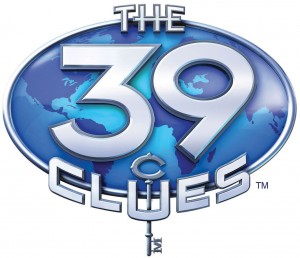
Q: How did you get involved in 39 Clues?
A: That was a phone call from Scholastic. I had no idea that it existed. They kept it a big secret. they called me and said, ‘Come on down, I have an idea for you.’ And I was like, ‘What, I’m the writer, I’m supposed to have an idea for you!’ They said, ‘Just come down, anyway.’ So I said, ‘Okay.’
I came down and I went into this big meeting, and they closed the door and they locked it! They don’t usually lock the doors for these publishing meetings. And they wanted me to sign a secrecy agreement. And I turned around, and there was Gordon Korman and Jude Watson sitting on a desk, and I said, ‘What are you doing here?’ And they said, ‘I don’t know.’ And I said, ‘Really?’ And they said, ‘No.’ So I signed the secrecy agreement and they told us about The 39 Clues.
Rick Riordan had come to Scholastic with this idea, and he’d written one book, but he couldn’t write the rest of them because he was so busy with Percy Jackson, and that’s alright, because they had this whole idea for a new concept which involved an online game where readers could jump into the story, and that was pretty groundbreaking because it was right at the beginning of different media entering [the mainstream.] It was right at the beginning.
And so they said, ‘Let’s not be afraid of it, let’s go there. Let’s go where the kids are and create this game so that gamers can come into the world of reading that way. Because the game doesn’t make sense if you don’t read the books. And we were like, ‘Ok, that sounds like a good idea.’ Then they said, ‘Rick can’t write the books. Why don’t we have a multi-author series? That way the books can come out every three or four months? Because if one person writes it, that’s about a year, right? This way, one person can write a book, the next person can write the next book, and the next person can start thinking about the next book, and it could get really exciting, what do you think? ‘
And we were like, ‘Okay…’ I mean, we never knew! it had never been done before. We each signed for two books, and then the other writers came pretty shortly after.
Q: Did you have to wait for the other writers to finish before you could start on your installment in the series?
A: No. We each wrote a very detailed outline. So we had to wait for the outline. The outline was way in advance of the book. But we had to make sure that we got the outline really detailed so when I started with Book 3, shortly I had Gordon Korman’s outline of Book 2, and he stuck closely to the outline so I knew what to do. Jude Watson, however, for Book 6, wrote the outline and I started Book 7, but when the galleys came out she totally changed the end of it, which made me completely rewrite the beginning of Book 7. But that was okay, because the ending really changed the story, it made the book more exciting.
Q: Did you expect the series to take off like that, to have a crazy following worldwide?
A: No, not quite so much. But a lot of times you can judge how well a series will do by how enthusiastic a publishing company is, and Scholastic was really excited for this project.
ON WRITING
Q: Walk us through your writing process.
A: I wake up in the morning, I go running. I live near Central Park so I go running in the morning. It clears my mind. I’m running along and I go, ‘Whoa, that’s the perfect way to end chapter 3!’ Because you’re free, and you’re sort of floating through the air, it’s great.
Then I go upstairs and I worry. I try to write and I can’t, I walk around and I eat some chocolate. And then I go back and then I try it again. In the beginning of the book, it’s constantly up and down, up and down because I have to get the voice exactly right. The voice is the most important part of the book.
In the very first pages of the book, it will take me a week or two to just write one page. Those first couple of weeks are terrible because I’m blocked all the time, I have to get it right. I work hours and hours and hours, and I have five pages after two weeks. After that it starts getting easier. In the middle of the book, I have some good days and bad days. But I always get up in the morning and get to work right away and try to work a full day. Towards the end of the book, when everything starts to fit into place, it’s almost like I’m in a different world. I can get up early in the morning and I can write all the way through the day without stopping. And sometimes I work through the whole night because I kind of feel like I’m in the zone or something.
I set page goals every single day, five pages, seven, ten. If I finish the goal by lunchtime, I’m done early. If I don’t, I just keep going until I’m done. I try to do those page goals every single day. By the end of the book, I’m often writing 23 pages a day, and it’s as easy as one page.
Q: Speaking of voice, you’ve written so many characters in the course of your career. How do you make each voice different from the rest?
A: I come from the theater, my first career was acting. That was all voice. I was used to a whole career where I was speaking the words of great playwrights and they knew about voice and about character. That was kind of my training. If it sounds false to me, I just can’t keep going. I have to go back until I get it right.
Part of it is theater training, part of it is the fact that when I wasn’t in theater, my ears were trained towards other people’s voices. And part of it is just honesty. When you’re in a conversation with people, you know when they’re telling the truth or not. I listen to my characters speak and I read my text aloud while I’m writing. Often when you do that, you get a real sense of whether the dialogue is real, or whether you’ve put words in the character’s mouth so it sounds more like the author than the character. After a while, after the first few chapters, the voice sinks into you like a set of clothing — you get used to it. Once the voice is in place, it becomes part of your DNA, and you carry it through the rest of the book. But setting it at the beginning takes a lot of work.
Q: Do you follow a formula in writing series books?
A: No, I try to make it as fresh as possible. It all boils down to the story. I try to think of a twist ending, I love twist endings. I always love stories where you expect it to end one way, then all of a sudden EEERK! Something happens that kind of makes you think of everything in a new way. I try to think of the beginning, I try to think of something really exciting that happens in the middle, and I try to think of a twist ending. I don’t plan — sometimes I think of a completely different ending, and I go, “Duh, this is much better!” And then I go back to the beginning, and change everything that I’ve written so far, just so I could get to that new ending.”
Q: You write books that are in completely different settings. What kind of research goes into your writing?
A: This is the golden age of research. I start online, just to get a vague idea from the information online. And then I go to the library, because there’s always some really great book which has information you can’t find online. And then I read. I look for things in the historical record that are mysterious. The mysteries all jump out at me.
Like when I started researching Hideyoshi (for the “Sword Thief”) and I found out about the taking of the swords from the countryside, and nowhere in historical record did anyone talk about where those swords were taken. And I thought, ‘If he took the swords from every farm and every person in the country, where’d he put them? There’s got to be thousands of them!’ So that became the basis for the whole plot.
One of the other things I do, especially for The 39 Clues or any book that involves travel in the contemporary time, I use two things: one is tourist videos on YouTube, which are amazing, because if you, as a writer, have never been to a country, what better way to get to a country, than normal people taking their video cameras on the street. You get a sense of who’s on the street, what kind of stuff they’re selling, what clothes they’re wearing, what it feels like, what the sky looks like…
The other thing I use is Google Earth, street view. Because I was doing “The Viper’s Nest” in Book 7… you know that scene where the Holts are threatening to blow up Uncle Alistair because they said he had a bomb in his hat? I had to find a place to set this crazy scene. It had to be private, and I’d never been to Pretoria, South Africa. So I’m going down the street level, and all of a sudden I see this street called “Boom Street.” And I thought, what better place to stage an explosion than Boom Street? I was able to set it in an exact place in Pretoria so that anyone who lived in Pretoria and read it could say, ‘Oh yeah, that could happen here.’
Q: What are your literary influences?
A: I love reading Jack London. One of the first books that made me become a writer was actually a story by Jack London called, “To Build a Fire.” It was so exciting, I was reading it one summer night and I began to shiver with cold. I thought to myself, ‘Wow, if this guy can make me do that with just words, that’s something I want to do, too.’
Edgar Allan Poe is someone I really like to read. Ray Bradbury, because he has amazing imagination. O. Henry, because he wrote stories with the most interesting endings. You wanna talk about twist endings? O. Henry was the master of twist endings. When I first started writing my first series, “Watchers,” and I wanted to master the twist ending, I read every single story that O. Henry wrote, just so I could figure out how to do that.
And then when I was a kid, there was this series called “Freddy the Pig” — that was the series I had to read every book of.
THE SEVEN WONDERS
Q: What was the inspiration for your new series, The Seven Wonders?
A: Three things that were basically failures. One was, I’ve always been interested in the seven wonders [of the ancient world]. My family is from Greece, and so when I visited Greece and I was in the island of Rhodes, I was fascinated by the idea of how they could have built a statue so tall ships could have passed underneath it. In ancient times. I thought it was impossible. How did they put it together? And I became fascinated with the rest of the seven wonders, but I couldn’t think of a way to make that come to life.
Another was the lost continent of Atlantis. The island of Crete, also in Greece, people thought was the source of the lost continent of Atlantis. But a lot of people have already written about that, so I parked it at the back of my mind.
One of the things I’ve always, always wanted to write about was a story that takes place on a desert island, where kids are isolated all by themselves and they don’t know why they’re there. I started a series about this years ago, and that didn’t quite work, so again I put it at the back of my mind.
All those three things — a funny thing about creativity, and a word to all writers — if you have an idea and you make it come to life, it doesn’t die. It stays at the back of your mind. I never thought of putting them together. But one day, when I started connecting Atlantis with the seven wonders, it began to make sense. It’s all in the same area in the world, but nobody’s made connections between them before. All I needed was the desert island. So I came up with the idea: what if the kids descendants of the royal family of Atlantis have a gene inside of them that takes whatever they’re good at — computers, sports, whatever — and turns that ability into a superpower, but anyone who’s had this condition has never lived past the age of 14? And all of the kids we have now in our story are thirteen and they’ve been taking from their home to an island where there are scientists who have found the cure? And what they need to do is find seven objects that were taken from the civilization of Atlantis and hidden in the seven wonders of the ancient world, and they will be cured. Problem: of the seven ancient wonders, six of them no longer exist. And that’s the big problem they have to face in the series.
Q: How many books are planned for the Seven Wonders series?
A: 7. The next book comes out in October. That’s about 9 months, and if you do the math, the series will wrap up perhaps by 2016, or 2015.
Q: Why do you think mythology is popular for the middle reader set?
A: I think it’s because there are big classic lessons of right and wrong, that’s all it boils down to. In this Seven Wonders series, a lot of it is mythology and a lot of it is also history. You take mythology — it’s all about power and right and wrong, good use of power, abuse of power… Kids are always thinking about that. They’re in a world where, when they’re little, the parents have all the power. And then they get a little older, they start thinking, ‘Wait a minute, what about me? What is right and wrong? What are the things that people do to me that are wrong? What are the things people do to me that are really good? What can I do? That’s the fascinating part about it. I think kids are constantly interested in that sort of thing.
I love mythology and I love history. I love the lessons of mythology and I also love the questions of history. When you write fiction, you can go back to the historical things and answer some of the questions that have never been answered in history, but you can answer them in a way that makes sense.
Q: How about series books? Why do you think they remain popular?
A: Because kids love to identify with the characters. Once they identify with them, they want to live with them for a very long time. It’s the same reason why TV series are popular, even with adults. We constantly want to go back to the world that we like and see what happens to the characters we identify with. It’s a basic human impulse.
ADVICE TO YOUNG WRITERS
Q: What is your advice to young writers?
A: Two things. One, read everything, everywhere… The only time you shouldn’t be reading is when you’re crossing the street!
Number two is practice. You never get anywhere without practice. Writing is like a musical instrument, and when you do it the better you get. When you’re young you have a great advantage, you’re so full of great ideas. You can write and you don’t even need to show anybody if you don’t want to. You can write things for yourself.
Eventually you can start showing it; there are so many ways. Fan fiction is great way that didn’t exist when I was a kid. My advice to you is not to worry about getting published, but to worry about telling a story. If you tell a story, it’s a skill that you’ll have your entire life, and eventually you’ll be able to pursue a career. Just keep it up and practice.
We then went on to the book-signing, and the event area of NBS Glorietta was filled with so many young fans — I think the median age was like, thirteen! It’s always nice to see young fans (and fellow AmIan fans!) turn out for an author they’ve been reading — the enthusiasm was contagious.
Elijah patiently waited for his turn at the book signing — I’ve never seen him sit still for more than two minutes. And he was ecstatic by the time he got to the stage:
It was an awesome Saturday for both of us, and I bet, for Peter, too.
We’ll definitely be reading the rest of the Seven Wonders series together!


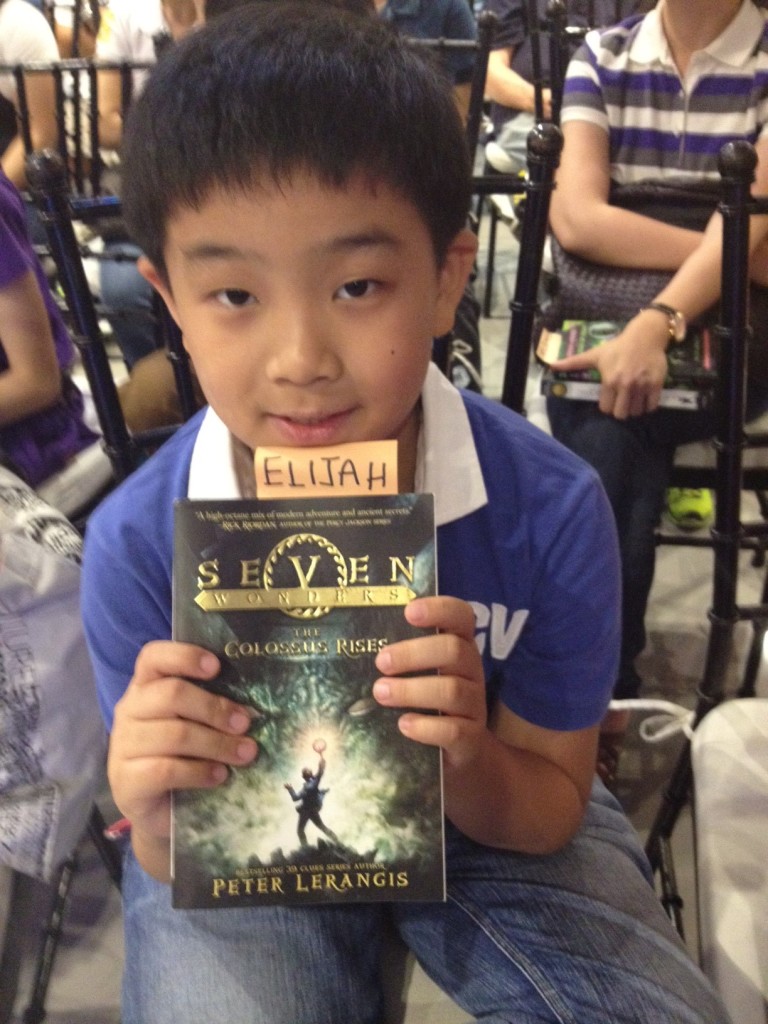
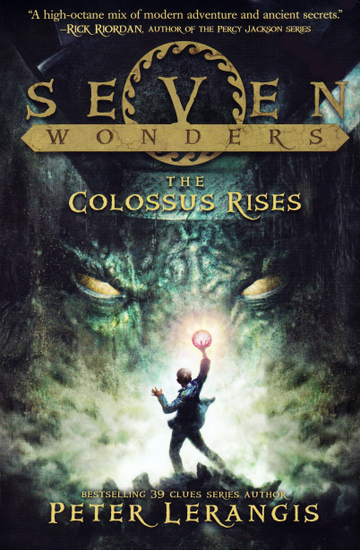
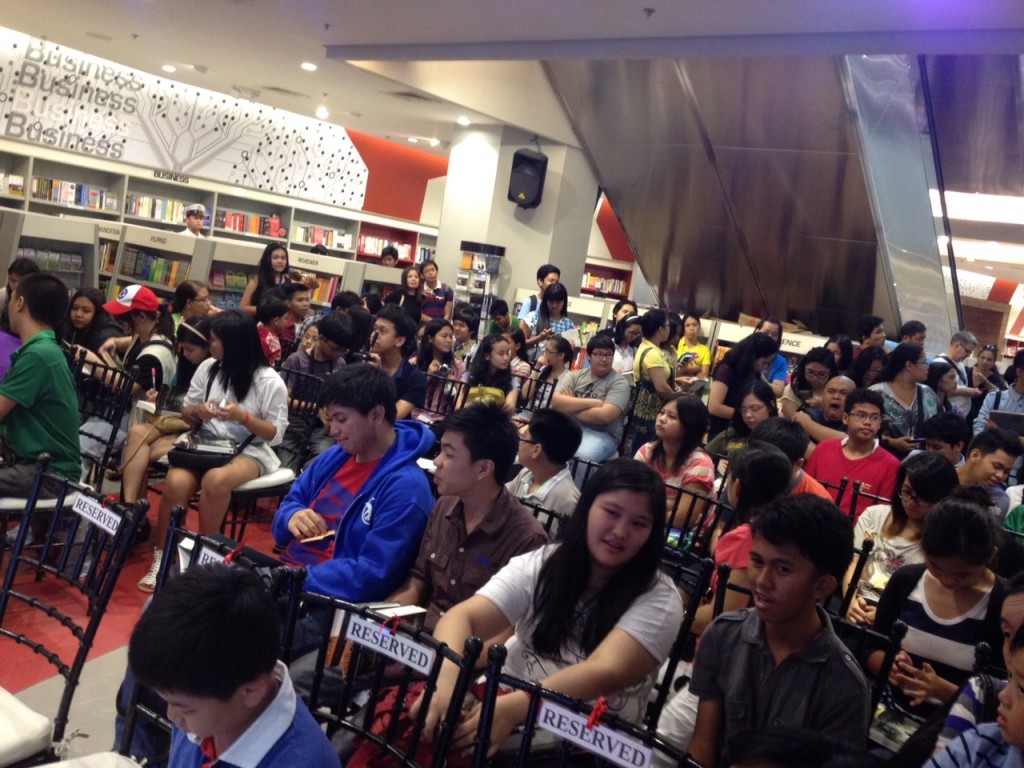

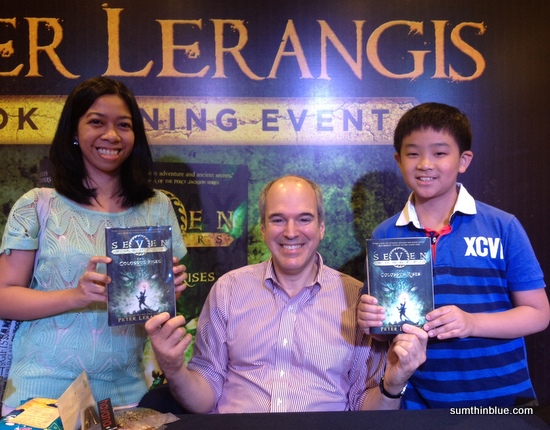
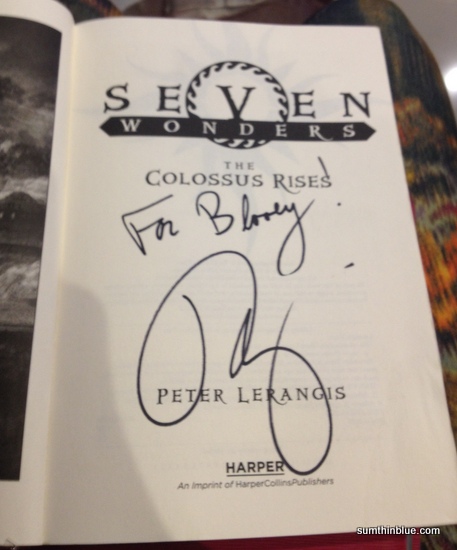
What a lovely post, Blooey. As you know, I also had a chance to meet him here in Singapore. Such a dynamic and brilliant man! I’m smitten! While he only wrote two books in Sweet Valley High, I still do consider him one of my childhood heroes. I can shamelessly declare that I loved that series! More than anything, I was struck by how radiant Peter’s character is. His voice, his vision shines through. :)
I totally agree with your impression of Peter! :P He was such a rock star, both at the interview and his book signing.
He’s my favorite author in 39 Clues, so I was gobsmacked when I found out he ghostwrote for all my childhood favorites as well. It was a once in a lifetime opportunity, to meet an author who’s captivated so many generations of readers.
Elijah had been looking forward to meeting him for over a month, and he was still raving about it when I saw him yesterday!
Hello, Ms. Blooey! Been reading your 39 Clues posts! Thanks for this wonderful interview; I didn’t know that he ghostwrote one of my favorite children’s book: Sweet Valley Twins!
Have you heard him sing? Here’s a link to our four-part video interview of him we (me and Cahill Philippines) got: http://www.youtube.com/playlist?list=PL0HjbNZpgJKJolnAoVgQ8Uz_RkoJLO_yd
P.S. I can spot myself and my co-members from Cahill Philippines in one of your pictures ;)
You’re welcome, Reneilda!
The Cahill Philippines club looks totally fab
I feel so bad. I just finished reading and reviewing The Colossus Rises, which I really enjoyed. I wish I got my book signed. It totally slipped my mind :/